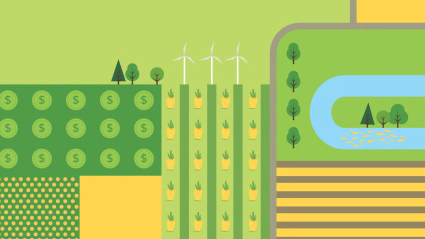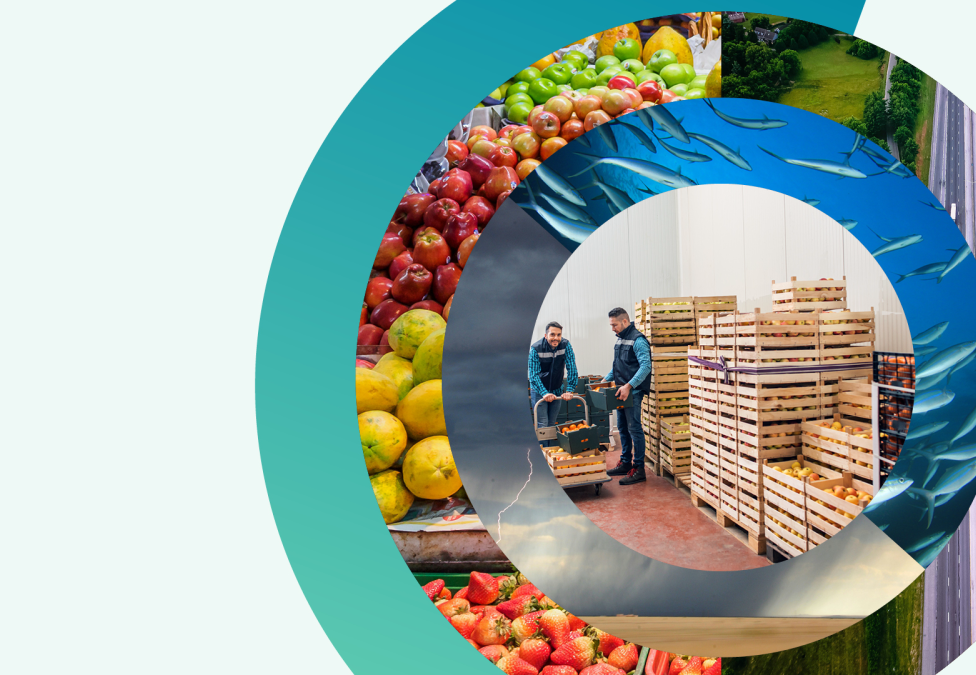As the impacts of climate change are increasingly felt around the world, leaders across sectors are acknowledging the significant role that food systems play in contributing to and responding to its environmental effects. Major shocks to the supply chain in recent years, from natural disasters and extreme weather to wars and pandemics, have highlighted the vulnerabilities in the global food system and the need for greater resiliency and sustainability. Despite this growing awareness, food systems have largely been excluded from climate financing strategies, representing fewer than 4 percent of investments.
To address the barriers and drivers needed to increase investments in creating nutritious, equitable, sustainable, and resilient food systems, Feeding Change hosted a series of seven panel discussions on climate financing for food systems transformation across the Milken Institute’s global events and through participation at COP28. This brief synthesizes those conversations into four key themes related to the trends, challenges, and opportunities for public, private, and nonprofit capital to drive food systems transformation. These themes inform three actionable opportunity areas for collaboration and activation ahead of COP30—and beyond.
Related Content
-

Milken Institute Statement on the Supreme Court’s Ruling That Limits the EPA’s Authority to Regulate Greenhouse Gas Emissions
Dan Carol Senior Director Milken Institute Center for Financial Markets and Climate Resilient Infrastructure Initiative While the Supreme Court’s decision in the West Virginia v. Environment Protection Agency case limits the EPA’s authority...Read StatementWhile the Supreme Court’s decision in the West Virginia v. Environment Protection Agency case limits the EPA’s authority and is a harsh setback for strategies to curb greenhouse gas emissions through...
Image
Dan Carol
Senior Director, Milken Institute FinanceDan Carol is a senior director on the Milken Institute Finance team. He leads Institute programming to accelerate effective deployment and financing of community-scale and climate resilient infrastructure, scale up regional innovation, and scale-up public-private partnerships. -

Weather and Waste: Rethinking Small Business Support Following a Natural Disaster
As of November 1, 2024, one each of 24 confirmed weather-related disasters in the United States caused damage associated with losses exceeding $1 billion. The year was one of the costliest since 1980. Nationally, the annual number of...Read ReportImage
Kristen Fanarakis
Associate Director, Small Business Policy and InnovationKristen Fanarakis is an associate director at MI Finance, leading the small business policy and innovation initiative. The Milken Institute Small Business Policy and Innovation Initiative analyzes the macroeconomic trends and policies affecting small businesses and offers policy recommendations and solutions aimed at fostering an environment of inclusive prosperity. Her work engages and educates policy stakeholders to address the challenges small businesses face. -

Accelerating a Green Recovery for Los Angeles: Pathways for Investing in Building Retrofits and Green Affordable Housing Development
Please read this summary of the virtual roundtable the Institute hosted with Los Angeles Mayor Eric Garcetti that explored how to facilitate a "green recovery" during the COVID-19 induced economic downturn while also advancing the goals...Read Report -

Food and Agriculture in Asia: Investing in Resilience, Health, and Sustainability
As the world reels from multiple crises in rapid succession, the opportunities to set food systems on a more sustainable and equitable path have never been more favorable, and in turn, the importance of multi-stakeholder convenings cannot...Read Report -

Municipal Securities Rulemaking Board (MRSB) on ESG
Submitted electronically Patrick Brett Chairman Municipal Securities Rulemaking Board (MSRB) 1300 I Street NW, Suite 1000 Washington, DC 20005 Mark T. Kim Chief Executive Officer Municipal Securities Rulemaking Board (MSRB) 1300 I Street NW...Read Letter -

World Leaders Join Prominent Experts in Business, Health, and Philanthropy to Discuss Pressing Global Issues at Milken Institute 2025 Global Conference
Los Angeles, CA (April 10, 2025 )—T he Milken Institute today announced its initial speakers and program agenda for the 2025 Global Conference , taking place May 4–7 at The Beverly Hilton in Los Angeles. Featuring more than 150 public...Read ArticleImage
Chad Clinton
Director, Media RelationsChad Clinton is the director of media relations for the Milken Institute. Hired to this role in August 2021, Clinton develops and executes strategies to amplify the Institute’s core messages by generating coverage of its pillar workstreams, experts, and events. -

Growing the US Green Bond Market: Lab 2
As climate-related events, including wildfires, become more prevalent throughout California, investors and issuers alike are looking for new tools to protect the state from increasingly devastating environmental disasters. At the same time...Read Report -

Financial Innovations Lab: Integrating ESG Data to Improve Risk Management and Municipal Resilience
Sustainable debt investments and the market for ESG data continue to expand. But without effective measuring and tracking of the ESG risks specific to each community, there is a limit to that growth. What’s unmeasured can’t be managed. If...Read Report 11
11

-

The Milken Institute Middle East and Africa Summit Returns to Abu Dhabi November 17-18
Washington, DC (November 16, 2022) – The 4th annual Milken Institute Middle East and Africa Summit returns to Abu Dhabi November 17-18 for the first time in more than two years. The summit will gather hundreds of attendees, including C...Read ArticleImage
Chad Clinton
Director, Media RelationsChad Clinton is the director of media relations for the Milken Institute. Hired to this role in August 2021, Clinton develops and executes strategies to amplify the Institute’s core messages by generating coverage of its pillar workstreams, experts, and events. -
-
Financing Green Building in Residential Development
Buildings are responsible for nearly 60 percent of Israel’s electricity consumption and contribute 28 percent of the country’s total greenhouse gas emissions. These statistics, from the Ministry of Environmental Protection, highlight our...Read Report -

Roundtable Summary: How Technology Can Accelerate Sustainable Finance
In a private roundtable at the Milken Institute Asia Summit 2022 in Singapore, the Milken Institute gathered leading technologists, chief sustainability officers, large investors, and financial regulators for off-the-record discussions on...Read ReportImage
Quintus Lim
Associate Director, Asia, Milken Institute InternationalQuintus Lim is an associate director of policy and programs for the International pillar at the Milken Institute. He focuses on policy areas such as R&D financing, technological adoption across domains such as health, food, agriculture, finance, and the broader economy, and issues of ecosystem building.






